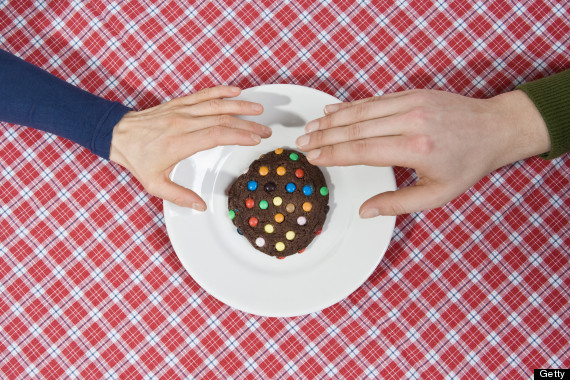
The Science Of Getting Over Heartbreak
Love is an addiction that was biologically designed so that we can mate successfully, said Helen Fisher, a senior research fellow at the Kinsey Institute, and New York-based author of “Anatomy of Love” who did a study last year linking love to substance abuse.
Unfortunately, like all addictions, a breakup can send you spiraling out of control.
You can’t eat, you can’t sleep, you have obsessive thoughts about your ex, and you’ll do anything to get him or her back, even if it means calling too many times or driving past your ex’s house at all hours of the day. And as soon as you get a response, you swing into euphoria — unless the response is negative, which can whip you back into despair.
“One main region of the brain (referred to as the brain’s reward system) is linked with all addictions — gambling, sex and all of the substance addictions: alcohol, nicotine, heroin and the others,” Fisher said. “That same region of the brain is activated when you’re rejected in love. That’s the biology of it.”
But unlike alcohol or gambling, which a fraction of people are addicted to, we’re all predisposed to love addiction, Fisher said.
“It’s a drive, a basic mating drive,” she said. “It evolved to help us rear our children as a team.”
Unfortunately, when this basic mating drive veers off track via an unwanted breakup for one person, it becomes a physical and emotional pain that you’ll have to deal with sans the help of an AA meeting or a rehab clinic.
But science has found ways to help with breakups. There are things you can do to make the pain go away faster, and there are things you might be doing that make your heartbreak worse.
You might find yourself journaling post-breakup, for instance, but while this seems like a therapeutic way to get all those thoughts out, it could make your heartbreak linger if you’re the type to brood or to ruminate.
Researchers at the University of Arizona found that those who looked for meaning in their relationships by writing in their journals made the least progress with their emotions — especially if they tend to seek a deeper meaning in their breakups. That’s because they continued the saga of their failed relationship through their journal, prolonging their suffering instead of moving on, said David Sbarra, psychology professor at the University of Arizona and author of the 2013 study.
If you do feel a need to journal, however, you should just write about your day. Those in the study who did not mention their breakup did well, Sbarra said. It helped them get back into their normal routine without focusing on their losses.
Talking about the breakup with someone other than your ex from a distanced, calm, rational perspective will also speed recovery, said Grace Larson, who authored a 2015 study on the topic.
“It helps you understand who you are outside of the ex-relationship,” Larson said. They end up using fewer “us” words when they spoke about the relationship, and used more “I” and “me” words.
But the talking shouldn’t go on for weeks, Fisher said.
After you’ve said everything you need to say, it’s time to stop mentioning your ex to anyone, she said.
Since love is an addiction, Fisher recommends using the AA method and treating an ex like something that is to be forbidden at all costs.
“Don’t write, don’t call, don’t show up at various places, don’t ask friends what he’s doing, don’t check him out on Facebook,” she said. “If you’re going to get rid of alcohol, don’t keep a bottle on your desk.”
It’ll be painful, but eventually, you’ll get over your ex. In her studies, Fisher said, they looked at the brain scans of people who were rejected mere weeks ago and those who were rejected months ago — and the brain activity declined as the separation increased, despite the memory of the event remaining strong. That means, she said, that the pain will decrease over time, though no one can definitively say how long it takes, as it varies from person to person depending on the length of the relationship and the flexibility of their emotions.
If all else fails, there’s an app to help.
Los Angeles-based Ellen Huerta founded Mend (starts at $4.99) when she was going through a bad breakup.
“I wanted a personal trainer to help me through a breakup,” Huerta said. Failing that, she wanted something or someone by her side every step of the way.
For the first 28 days of the breakup, Mend offers a heartbreak cleanse, which focuses on your body to help with the withdrawal symptoms, Huerta said.
Each day, it will advise you on how to self-soothe, to focus on your breath. In addition, you can check in and write in the app’s journal.
After you get through the first month, you graduate to the next step in Mend, which focuses less on the breakup and more on rebuilding your sense of self and your future.
“We do trainings about being single and dating and having a healthy relationship practice,” said Huerta, who said she managed to get over her heartache while she was developing her app.
And while she won’t reveal the number of subscribers, she said there are Mend users in more than 150 countries.
“Heartbreak is so universal,” Huerta said.



















